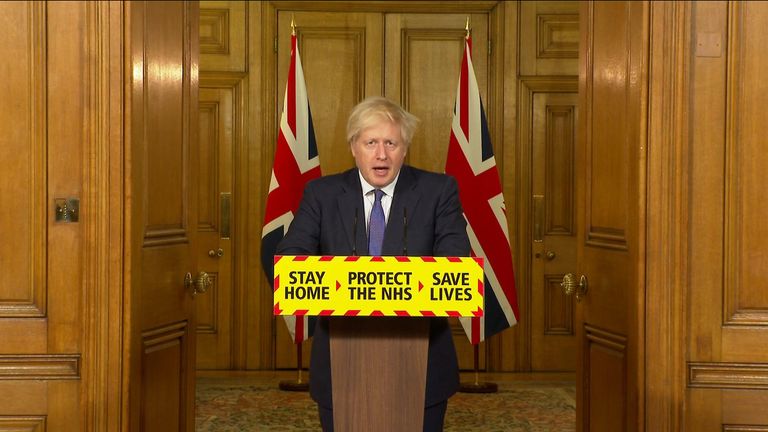The government’s decision to allow free travel to and from Greece last summer could have had a significant impact on the spread of the virus, according to a Public Health England study quietly published this week.
The previously unreported analysis, which was conducted by PHE and the COVID-19 Genomics UK Consortium, revealed that Greece was the largest source of imported infections between June and September, making up 21% of new cases, compared with 16% for Croatia and 14% for Spain.
It also suggested that holidaymakers who didn’t need to quarantine – as those from Greece did not – were more likely to pass on the virus once they arrived back.
From 4 July 2020, “travel corridors” were introduced with countries the government believed were low risk for COVID-19, allowing anyone coming from these locations to avoid quarantine when they came to England.
Whereas countries such as Spain and France were put on a quarantine list when cases rose, meaning that holidaymakers had to self-isolate for 14 days after they returned to the UK, the travel corridor to Greece was left open until November.
The study, which has not yet been peer-reviewed, found that this not only affected the number of travellers coming from a country, but also the onward spread of the virus once they arrived in England.
Dinesh Aggarwal of the University of Cambridge, one of the study’s co-authors, said travel restrictions made “a significant difference”, saying that travellers who did not have to self-isolate were linked to more than five times as many genetically similar cases as those who did.
Experts said the findings showed that travel restrictions could dilute the spread of the virus, but only if they were properly applied.
“Failure to restrict travel to and from Greece seems to have led to the unnecessary importation of a large amount of virus,” said Simon Clarke, Associate Professor in Cellular Microbiology at the University of Reading.
“It’s like shutting the door but leaving the skylight open,” said Stephen Griffin, Associate Professor of Virology at the University of Leeds.
“It seems that little was learnt from the widespread seeding of infections across the UK by returning travellers early in the first wave,” said Martin McKee, professor of European public health at the London School of Hygiene and Tropical Medicine.
The study used data collected by Test and Trace to identify people who had caught coronavirus while travelling, finding a total of 4,207 positive cases.
The vast majority of these cases came from Europe, with three countries accounting for more than half of infections: Spain, which was the source for 589 cases, Croatia, which was the source for 685, and Greece, which was the source for 882, or 21% of the total.
The researchers also had access to Test and Trace’s contact tracing data, which showed that the 4,207 cases had 18,856 contacts in the days before symptom onset or a positive test.
The scientists – who came from the University of Cambridge, the Wellcome Sanger Institute, the Quadram Institute Bioscience and Imperial College London – found that the number of contacts a person had depended on a large extent on whether or not they were required to isolate on returning to the UK.
The study concluded that “travel restriction reduced the number of contacts per case by 40%” across the board, but had an even larger effect on 16 to 20-year-olds, the age group with the most contacts. Travel restrictions reduced the average number of contacts for someone of that age from nine to 4.7.
Not all contacts result in infections, so the scientists also looked at genomic sequencing data, taking genetic material from 10% of the positive cases and comparing it to the whole UK database of coronavirus genomes.
When someone came back from a country with travel restrictions then tested positive, their unique genome was picked up 1.2 times over the next four weeks on average. When they came back from somewhere without travel restrictions, their unique genome was picked up in an average of 11.3 cases.
Those cases weren’t necessarily linked to the original traveller, so it was not possible for the scientists to calculate exactly how many cases had been caused by the absence of travel restrictions.
But by analysing the genetic data and the contact tracing data, along with other sources of information, the researchers were able to put a figure on the difference in genetically-linked cases when travel restrictions were in place compared to when they were not – a figure that indicated a five-fold difference.
“In the four weeks after a case returned from a country without travel restrictions, you saw just over five times the number of cases that were genomically related in England, when compared to a country without a travel restriction,” said Mr Aggarwal.
The paper is likely to reignite the debate about travel corridors, which are expected to return in some form as restrictions are eased in the spring.
Some saw the findings as evidence that even “tougher” restrictions were not strict enough, as they still allowed some cases to pass through, which posed a worry given the possibility of new, more transmissible variants.
Dr Griffin said that voluntary quarantine was “leaky”, calling it a “halfway house”.
By contrast, Dr Clarke said the findings showed that “last summer’s travel restrictions broadly worked”, an assessment the Department of Transport agreed with.
“As this report rightly points out, travel restrictions imposed by government were effective in reducing the transmission of imported cases of COVID-19,” a DfT spokesperson told Sky News.
“Guided by the latest scientific data, the government acted rapidly to remove travel corridors with Greece and Spain, and we continue to have robust measures in place to protect the country against imported cases of the virus.”


